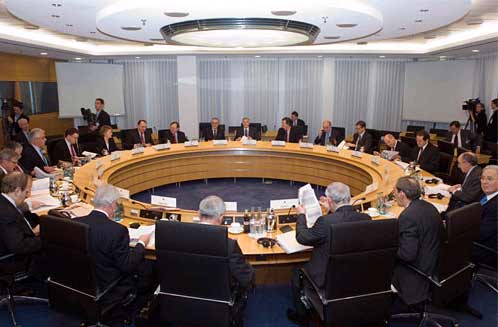|
Financial authorities across the world - from the Americas to Europe and the Asia Pacific - vowed to follow the UK lead and take emergency measures, including nationalisation of major banks, to shore up banks and boost sagging credit and stock markets. Stocks opened higher in most markets and recovered further following measures announced by governments and financial sector regulators to bail out hundreds of banks in the US and Europe. European shares opened 4.5 per cent higher on the back of major gains in Asia. 
Britain is reported to have spent as much as 37 billion pounds ($64 billion) to buy stakes in top UK banks – a move that would see the UK government becoming the biggest shareholder in Royal Bank of Scotland and HBOS. The French government also announced a 40 billion euro ($54.89 billion) fund to buy into banks while Germany and Italy are expected to make similar moves. Germany, Europe's largest economy, is expected to spend as much as 400 billion Euros to bail out banks, media reports cited government sources as saying. The actions follow an emergency meeting of Euro zone leaders in Paris- notably France, Germany and Italy - to coordinate emergency measures to help banks through the worst financial crisis since the 1930s. In a joint announcement with the US Federal Reserve, European central banks agreed to boost dollar liquidity of commercial banks and lend out as much US dollar as commercial banks need to tame the money market. The European Central Bank, the Bank of England and the Swiss National Bank said they would meet all dollar bids from commercial banks at a fixed interest rate. Australia, New Zealand, Indonesia and India also moved to shore up liquidity and assure bank depositors that the financial institutions are strong. Indonesia upped its guarantee to 2 billion rupiah ($203,000) while India pledged more liquidity to help financial markets. The moves seem to have helped halt the chaos that has frozen credit markets and threatened a global recession, at least for the present. ''I believe that we will see over the coming few days worldwide action that will make people see that confidence in the banking system can be restored," British prime minister Gordon Brown said. US stock index futures rose more than 3 per cent on Sunday evening ahead of Monday's gains while German stocks rose 5 per cent in off-exchange trading with major gains by bank stocks. New Zealand's dollar also emerged stronger. The European bailout plan, backed by prime ministers and presidents of the 15 eurozone countries, included state guarantees for new medium-term bank debt and injection of fresh capital into banks. The European Central Bank also unfroze the commercial paper market. While the details of European governments' plans to acquire stakes in major bans are yet not known, these are likely to emerge emerge during the week, starting with France, Germany and Italy on Monday. Washington has pushed through a $700 billion state-funded rescue plan for banks in US stuck with illiquid mortgage debt. Portugal will extend a financing line worth 20 billion euros ($27.45 billion) to guarantee the liquidity of its banks while the Norwegian government announced plans to provide $57 billion in liquidity for commercial banks. Australia and New Zealand said they were working together to offer blanket bank deposit guarantees. Gulf Arab states also announced steps to boost confidence in the financial system, including a cut in the repo rate by Saudi Arabia and the United Arab Emirates's pledge to protect national banks and guarantee deposits. See: Europe unveils bailout plan
|